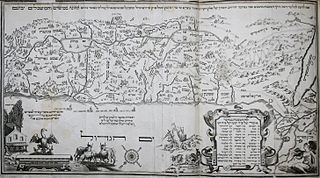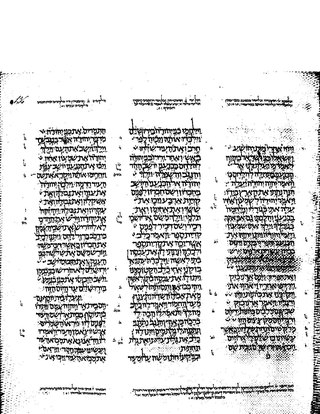Manasseh (Hebrew : מְנַשֶּׁה, Modern: Menaše, Tiberian: Mənaššé) is both a given name and a surname. Its variants include Manasses and Manasse.
Notable people with the name include:

Isaiah, also known as Isaias or Esaias, was the 8th-century BC Israelite prophet after whom the Book of Isaiah is named.
Zephaniah is the name of several people in the Hebrew Bible; the most prominent being the prophet who prophesied in the days of Josiah, king of Judah and is attributed a book bearing his name among the Twelve Minor Prophets. His name is commonly transliterated Sophonias in Bibles translated from the Vulgate or Septuagint. The name might mean "Yah has concealed", "[he whom] Yah has hidden", or "Yah lies in wait".

According to the Hebrew Bible, the Tribe of Manasseh was one of the Tribes of Israel. It is one of the ten lost tribes. Together with the Tribe of Ephraim, Manasseh also formed the House of Joseph.

Manasseh was the fourteenth king of the Kingdom of Judah. He was the oldest of the sons of Hezekiah and his mother Hephzibah. He became king at the age of 12 and reigned for 55 years.

Josiah or Yoshiyahu was the 16th King of Judah. According to the Hebrew Bible, he instituted major religious reforms by removing official worship of gods other than Yahweh. Josiah is credited by most biblical scholars with having established or compiled important Hebrew scriptures during the "Deuteronomic reform" which probably occurred during his rule. Josiah became king of the Kingdom of Judah at the age of eight, after the assassination of his father, King Amon. Josiah reigned for 31 years, from 641/640 to 610/609 BCE.
The Prayer of Manasseh is a short, penitential prayer attributed to king Manasseh of Judah.

Amon of Judah was the fifteenth King of Judah who, according to the biblical account, succeeded his father Manasseh of Judah. Amon is most remembered for his idolatrous practices during his short two-year reign, which led to a revolt against him and eventually to his assassination in c. 641 BC.
Peres is a Portuguese, Galician, and Sephardic-Jewish surname. Its Spanish variant is Pérez.

Matthew 1:10 is the tenth verse of the first chapter in the Gospel of Matthew in the Bible. The verse is part of the section where the genealogy of Joseph, the father of Jesus, is listed.

The Twelve Tribes of Israel are, according to Hebrew scriptures, the descendants of the biblical patriarch Jacob, who collectively form the Israelite nation. The tribes were through his twelve sons through his wives, Leah and Rachel, and his concubines, Bilhah and Zilpah. In modern scholarship, there is skepticism as to whether there ever were twelve Israelite tribes, with the use of the number 12 thought more likely to signify a symbolic tradition as part of a national founding myth.
Tamar is a female name of Hebrew origin, meaning "date", "date palm" or just "palm tree". There are three characters in the Bible with this name. The pronunciation of Tamar depends on each so-named person's language, culture, and idiolectic preference; typical pronunciation in the original Hebrew is ; typical pronunciations in English are and. Variants include Tamary and "Tamara".
Manasses or Manasseh is a biblical Hebrew name for men. It is the given name of seven people of the Bible, the name of a tribe of Israel, and the name of one of the apocryphal writings. The name is also used in the modern world.
Gamaliel, also spelled Gamliel, is a Hebrew name generally interpreted "God (אל) is my (י-) reward/recompense (גמל)". Solomon Gandz suggests instead that it should be read "battle-axe of God". A number of influential individuals have had the name:

Manasseh or Menashe was, according to the Book of Genesis, the first son of Joseph and Asenath. Asenath was an Egyptian woman whom the Pharaoh gave to Joseph as wife, and the daughter of Potipherah, a priest of On. Manasseh was born in Egypt before the arrival of the children of Israel from Canaan.
Manasses is a masculine given name of ancient Hebrew origin.

The Assyrian captivity is the period in the history of ancient Israel and Judah during which several thousand Israelites from the Kingdom of Israel were forcibly relocated by the Neo-Assyrian Empire. This is one of the many instances of the resettlement policy of the Neo-Assyrian Empire. The Kingdom of Israel was conquered by the Neo-Assyrian monarchs Tiglath-Pileser III and Shalmaneser V. The later Assyrian rulers Sargon II and his son and successor, Sennacherib, were responsible for finishing the twenty-year demise of Israel's northern ten-tribe kingdom, although they did not overtake the Kingdom of Judah. Jerusalem was besieged, but not taken. The tribes resettled by Assyria later became known as the Ten Lost Tribes.
Manasse is a surname. Notable people with the surname include:

2 Kings 21 is the twenty-first chapter of the second part of the Books of Kings in the Hebrew Bible or the Second Book of Kings in the Old Testament of the Christian Bible. The book is a compilation of various annals recording the acts of the kings of Israel and Judah by a Deuteronomic compiler in the seventh century BCE, with a supplement added in the sixth century BCE. This chapter records the events during the reign of Manasseh and Amon, the kings of Judah.

2 Chronicles 33 is the thirty-third chapter of the Second Book of Chronicles the Old Testament of the Christian Bible or of the second part of the Books of Chronicles in the Hebrew Bible. The book is compiled from older sources by an unknown person or group, designated by modern scholars as "the Chronicler", and had the final shape established in late fifth or fourth century BCE. This chapter belongs to the section focusing on the kingdom of Judah until its destruction by the Babylonians under Nebuchadnezzar and the beginning of restoration under Cyrus the Great of Persia. It contains the regnal accounts of Manasseh and Amon, the kings of Judah.

Judges 18 is the eighteenth chapter of the Book of Judges in the Old Testament or the Hebrew Bible. According to Jewish tradition the book was attributed to the prophet Samuel, but modern scholars view it as part of the Deuteronomistic History, which spans in the books of Deuteronomy to 2 Kings, attributed to nationalistic and devotedly Yahwistic writers during the time of the reformer Judean king Josiah in 7th century BCE. This chapter records the activities of the tribe of Dan, and belongs to a section comprising Judges 17 to 21.